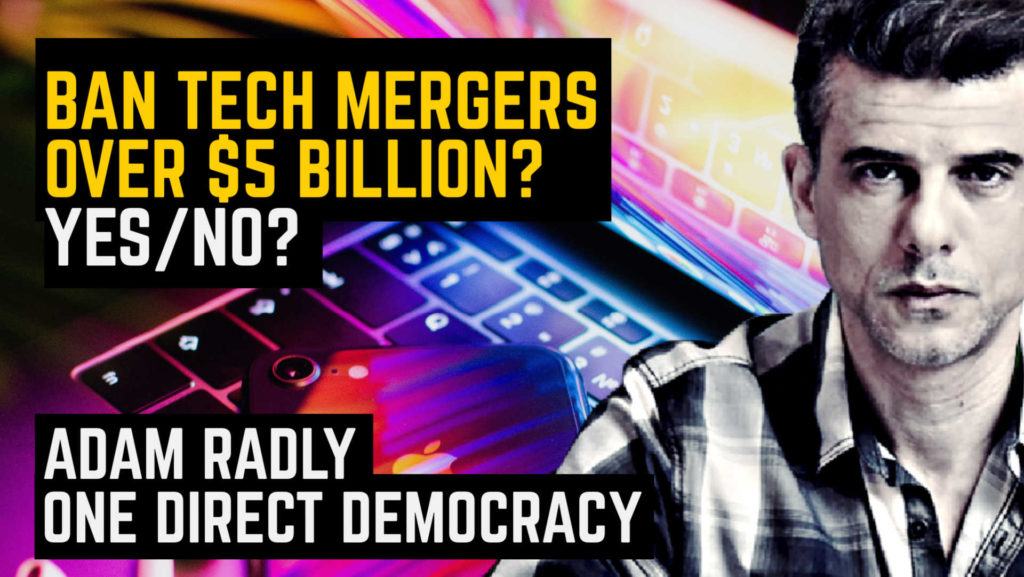Ban Tech Mergers Over $5 billion? Yes/No?
Senator Elizabeth Warren has introduced legislation in Congress that would effectively ban large technology mergers. It’s called the Prohibiting Anticompetitive Mergers Act (PAMA).
The simplified interpretation of this legislation is that it would break anything that is big and it would prevent anything from becoming big in the future. Will this solve any real issues? Will it cause more problems than it solves?
If you could vote directly on this policy, would you vote for it or against it?
Before getting into any detail, let’s just try to understand where Senator Warren is coming from. I’m going to refer to articles from Vox and Engadget.
Engadget: Her new bill, the Prohibiting Anticompetitive Mergers Act, doesn’t just break up Big Tech: It breaks up Big Everything, and it prevents companies from getting too big in the future. It would also fundamentally change how agencies evaluate and block proposed mergers, a process that currently gives companies a lot of power and agencies relatively little. Warren says the bill crystallizes her vision for how the government can stop industry consolidation that has broken America’s markets, hurt its economy, and threatening its democracy.
As far as I can tell there seems to be an underlying philosophy to break up anything that’s big and prevent companies from getting big in the first place. Okay, so, what is this bill proposing to actually do?
Engadget: The Prohibiting Anticompetitive Mergers Act (PAMA) would make it illegal to pursue “prohibited mergers,” including those worth more than $5 billion or which provide market shares beyond 25 percent for employers and 33 percent for sellers.
So the assumption here is that merges that meet this criteria are anti-competitive.
Engadget: The bills would also give antitrust regulators more power to halt and review mergers. They would have the authority to reject mergers outright, without requiring court orders.
So there would be no legal process. The regular will just decide in their infinite wisdom that a merger is anti-competitive. This is how it works now and how it will change if this legislation becomes law:
Vox: The Prohibiting Anticompetitive Mergers Act also fundamentally changes the agencies’ merger review process and power. Right now, if companies want to merge, it’s on the FTC or the DOJ to make the case for why they shouldn’t, and they have to sue the companies to block them. The onus is entirely on the agencies, which oversee thousands of mergers a year. With relatively little in resources, they can only challenge a few of those mergers. Doing so may mean a long court battle that’s difficult to win.
So Warrens wants to swap the burden of proof from being on the government to being on the companies.
Vox: With Warren’s bill, it’s the companies that have to do the work. They have to show that their proposed merger won’t harm competition, consumers, and the labor market. If they can’t, the agencies have to reject it. The companies have to sue if they still want to merge. Ideally, companies will try to merge less, and the mergers they do try won’t be harmful.
The legislation is not just targeting mergers worth more than $5 Billion
Engadget: They would likewise bar mergers from companies with track records of antitrust violations or other instances of “corporate crime” in the past decade.
Engadget: Officials would have to gauge the impact of these acquisition on labor forces, and wouldn’t be allowed to negotiate with the companies to secure “remedies” for clearing mergers.
So, the companies wouldn’t even be allowed to secure a remedy, meaning that if the companies could adjust the deal term to make sure the merger was not anti-competitive they won’t be allowed to do it.
Engadget: Crucially, PAMA would formalize procedures for reviewing past mergers and breaking up “harmful deals” that allegedly hurt competition. The Federal Trade Commission has signaled a willingness to split up tech giants like Meta despite approving mergers years earlier. PAMA might make it easier to unwind those acquisitions and force brands like Instagram and WhatsApp to operate as separate businesses.
This is the most unusual and controversial part of the policy. Again, Warren wants regulators to be able to make these massive decisions without even bothering to get a court order.
Engadget: The act isn’t strictly focused on tech, but Warren made clear that industry was a target. She cautioned the FTC on Amazon’s proposed buyout of MGM Studios, and challenged Lockheed Martin’s since-abandoned attempt to buy Aerojet Rocketdyne.
Amazon didn’t have a studio before buying MGM so I don’t see how this is anti-competitive.
Engadget: If it becomes law, PAMA would ban the Amazon-MGM union (worth over $8.4 billion), Microsoft’s Activision deal ($68.7 billion), and relatively modest acquisitions like Google’s planned buyout of Mandiant ($5.4 billion). Tech firms would largely have to focus on acquiring ‘small’ companies, and would largely have to forego deals meant to expand market share or otherwise cement dominance in a given market.
There’s no reason to believe that smaller transactions will fix any of the problems Warren seems to be trying to fix.
This is my personal opinion on this issue:
Firstly, this legislation makes the assumption that companies are made up of separate business units that can just be removed when a regulator tells them to do it. That’s not correct.
Second, if companies know that a deal might be reversed after it was approved there will be less deals.
Third, all mergers are not the same. Senator Warren is proposing these rules to prevent anti-competitive behavior but these rules will also stop mergers that save companies, create jobs, and increase competition. This legislation is obviously an extension of antitrust regulations. I don’t see any attempt to explain the problems with existing antitrust rules and how these new rules address them.
The reality is that some mergers are very good for consumers and employees and, in many cases, some mergers will actually save a company from bankruptcy. As far as I’m concerned, every merger needs to be reviewed individually and assessed on its merits.
I’ve created a listing on the One Direct Democracy platform so that we can develop ideas about how the Prohibiting Anticompetitive Mergers Act (PAMA) be improved. You can add your own ideas or vote and comment on ideas from other people. You can also create your own listings for people to vote on. It’s a simple way to get used to using the One Direct Democracy system.
So that’s the summary of the key issues.
If you could vote directly on this proposed policy, would you vote for it or against it?
The reality is that we have reached a point in time in our evolution where Representative Democracy no longer serves the will of the people.
That’s why I created One Direct Democracy. It’s a movement for upgrading the global democratic system by taking the power away from politicians and putting it in the hands of the people by using direct democracy.
I’ve created the technology, a framework for direct democracy and a plan for how to make it happen. We don’t have to convince any politicians or powerful people to do anything to make this happen. We have the power to do it on our own. We just have to decide to do it.
Direct Democracy is the purest form of democracy.
Representative Democracy is an outdated blunt instrument.
Links to related content



